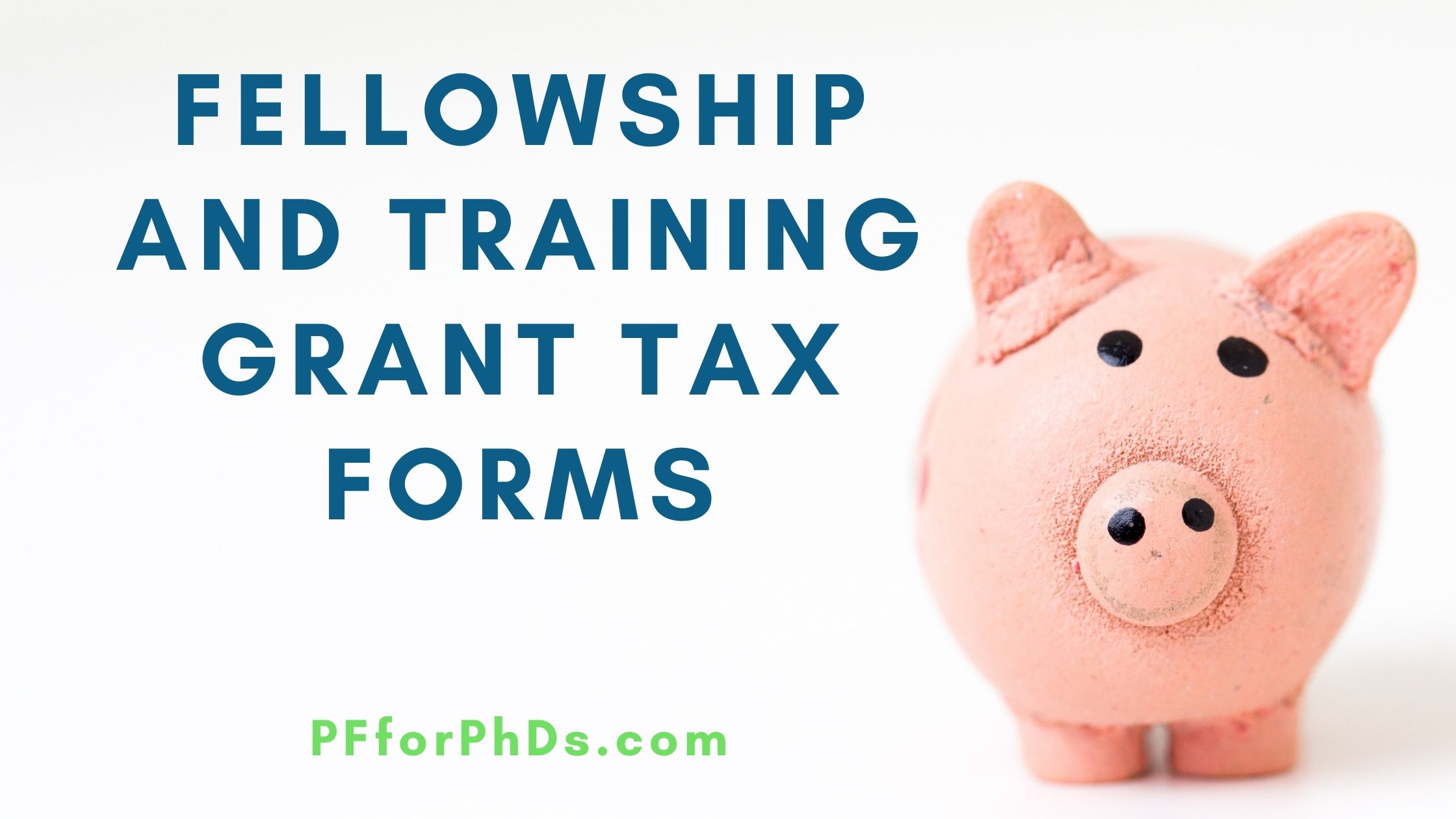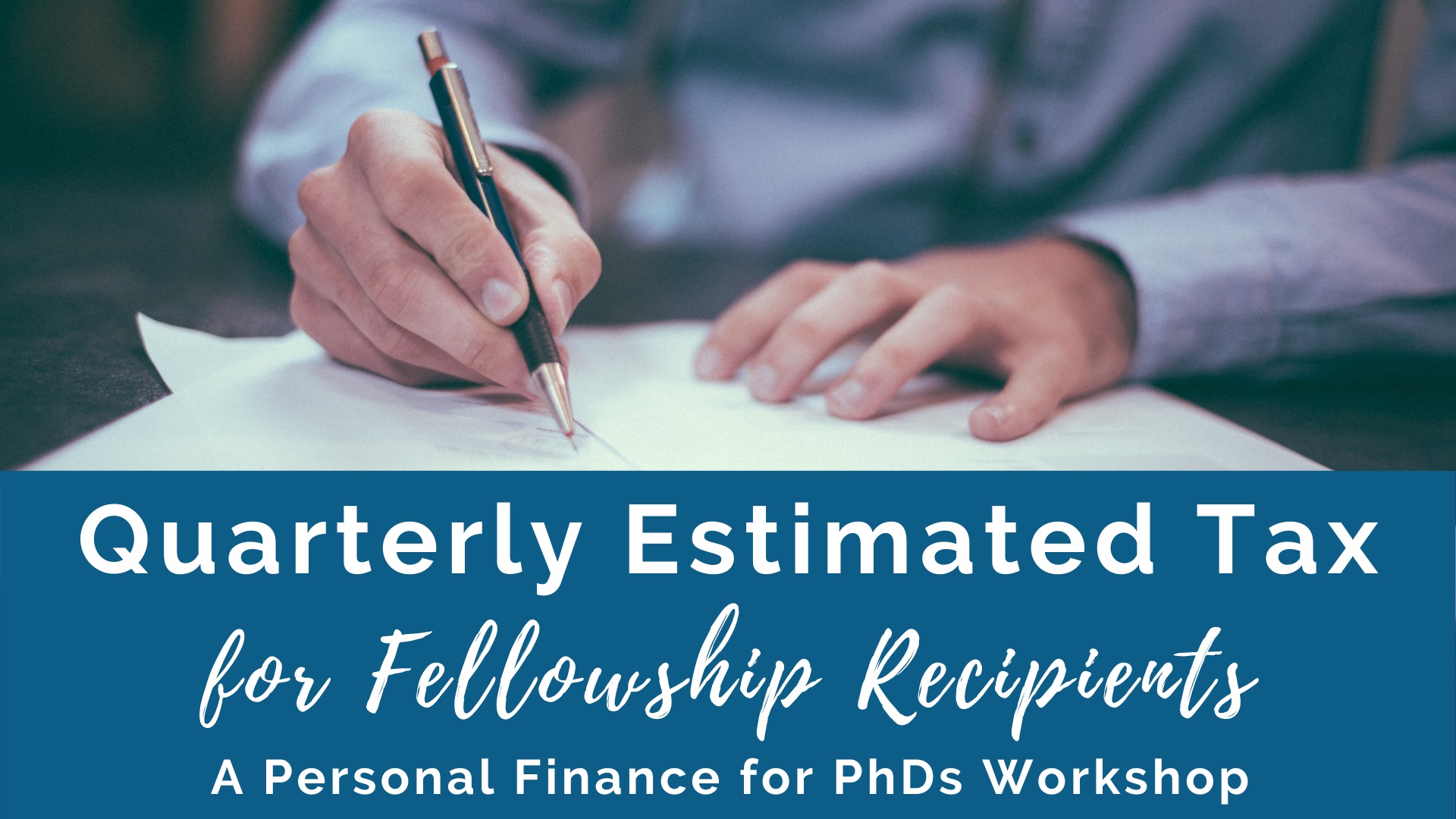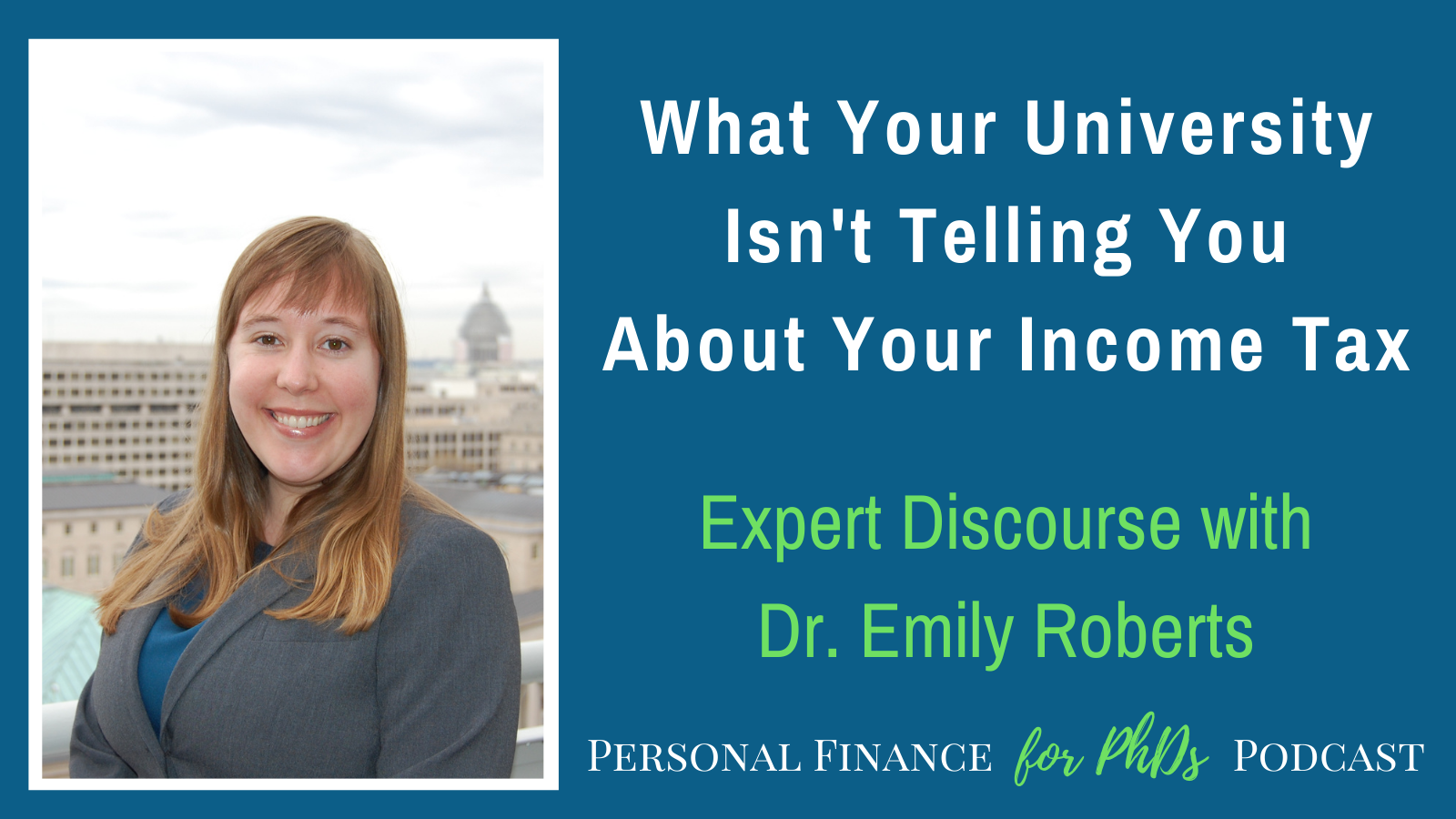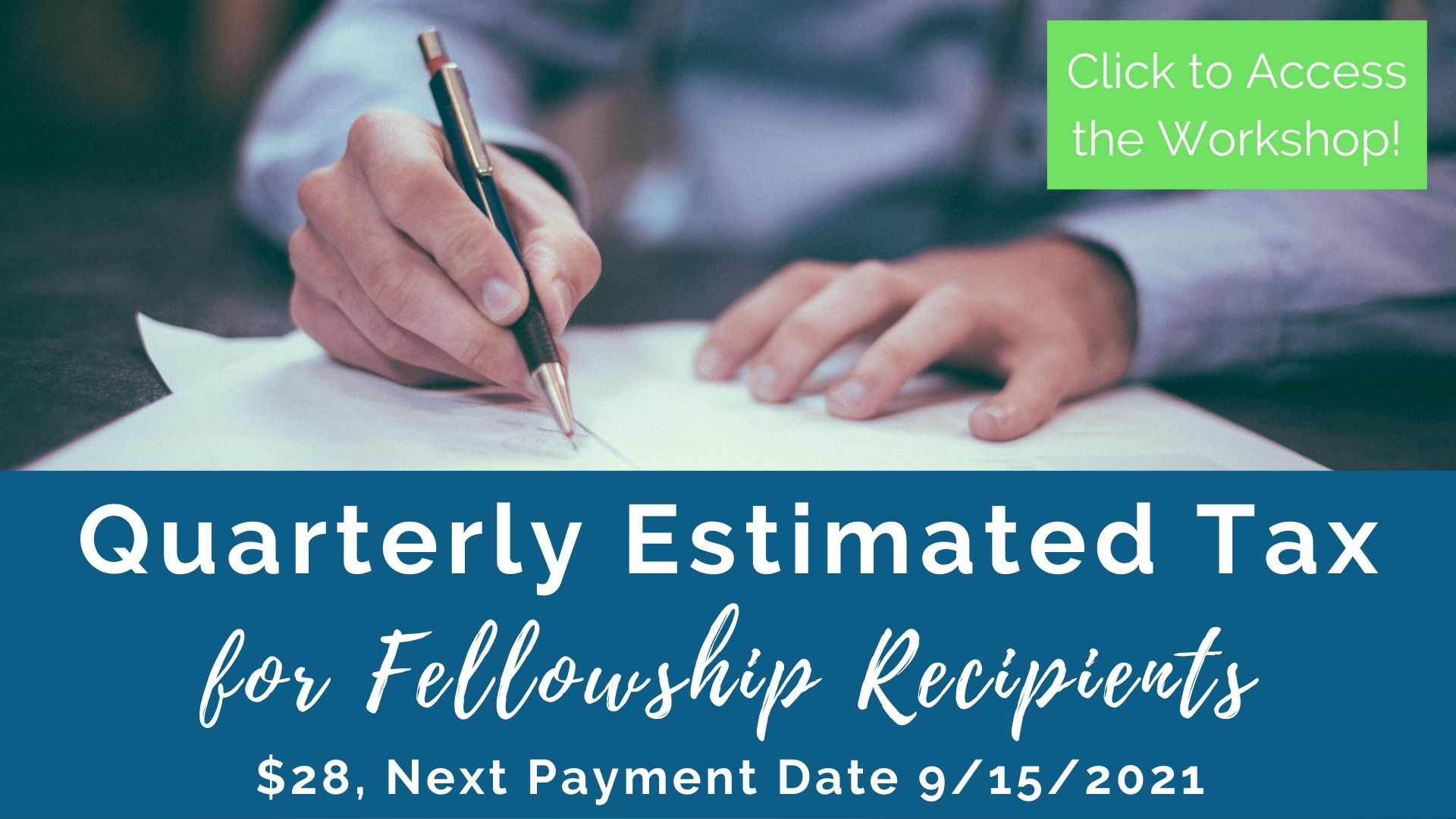There is no single correct IRS tax form on which to report PhD trainee fellowship and training grant stipends and salaries. Universities and funding agencies take different approaches, which often confuses grad students, postdocs, and postbacs. This article shares the crowd-sourced information on how universities and funding agencies are reporting fellowship and training grant income.
Please contribute to this project by filling out this survey to have your tax form included in this article—and share the survey as well.

I have included the number of entries that I’ve received for each type of tax form.
Further reading:
- What Your University Isn’t Telling You About Your Income Tax
- Do I Owe Income Tax on My Fellowship?
- What Is a Courtesy Letter?
Tax Year 2024 Survey Results
External Fellowships
National Institutes of Health (NIH)
Continuing Education Training Grant (T15)
The T15 has been reported on a:
- Form 1098-T Box 5 (1 entry)
Intramural Research Program: Postdoctoral Research Training Award (IRTA)
The postdoc IRTA has been reported on a:
- Form 1099-G in Box 6 (1 entry)
Ruth L. Kirschstein Institutional National Research Service Award (T32)
The T32 has been reported on a:
- Courtesy letter (2 entries)
- W-2 (1 entry)
Ruth L. Kirschstein Predoctoral Individual National Research Service Award (F31)
The F31 has been reported on a:
- Form 1099-MISC Box 3 (2 entries)
It has also been not reported in any way (1 entry)
Linked Training Award (TL1)
The TL1 has not been reported in any way (1 entry)
National Science Foundation
Research and Mentoring for Postbaccalaureates in Biological Sciences (RaMP)
The RaMP has been reported on a:
- Courtesy letter (1 entry)
Graduate Research Fellowships Program (GRFP)
The GRFP has been reported on a:
- Form 1098-T Box 5 (2 entries)
- Courtesy letter (1 entry)
It has also been not reported in any way (2 entries)
National Aeronautics and Space Administration
Future Investigators in NASA Earth and Space Science and Technology (FINESST)
The FINESST has been reported on a:
- Form 1098-T Box 5 (1 entry)
It has also been not reported in any way (1 entry)
American Institute of Indian Studies
Junior Fellowship
The Junior Fellowship has not been reported in any way (1 entry)
National Institute for Occupational Safety and Health
Occupational Health Psychology Total Worker Program
The Occupational Health Psychology Total Worker Program funding has not been reported in any way (1 entry)
Internal Fellowships
Harvard University
Funding (stipend) for doctoral students still in coursework has not been reported in any way (1 entry – told to use paystub for reporting to IRS)
Northwestern University
The First-Year Fellowship was reported on a courtesy letter (1 entry – letter was requested by recipient).
Stanford University
Funding (stipend) for doctoral students has been reported on Form 1098-T Box 5 (1 entry).
University of Connecticut
The Jorgensen Fellowship has not been reported in any way (1 entry).
University of Pennsylvania
The Educational Fellowship has not been reported in any way (1 entry).
Vanderbilt University
Funding (stipend) for doctoral students has been reported on Form 1098-T Box 5 (1 entry).
Non-tuition scholarship awards (e.g., health insurance, health fee award) have been reported on Form 1098-T Box 5 (1 entry).
Tax Year 2023 Survey Results
External Fellowships
National Institutes of Health (NIH)
Dissertation Award (R36)
The R36 has not been reported in any way (1 entry).
Intramural Research Program: Postdoctoral Research Training Award (IRTA)
The postdoc IRTA has been reported on a:
- Form 1099-NEC Box 1 (1 entry)
Ruth L. Kirschstein Institutional National Research Service Award (T32)
The T32 has been reported on a:
- Form 1098-T Box 5 (3 entries)
It has also been not reported in any way (2 entries).
Ruth L. Kirschstein Predoctoral Individual National Research Service Award (F31)
The F31 has been reported on a:
- Form 1098-T Box 5 (2 entries)
- Form 1099-MISC Box 3 (1 entry)
National Science Foundation
Graduate Research Fellowships Program (GRFP)
The GRFP has been reported on a:
- Form 1098-T Box 5 (2 entries)
- Form W-2 (1 entry)
It has also been not reported in any way (1 entry).
Internal Fellowships
Harvard University
The Prize Fellowship has not been reported in any way (1 entry).
Mayo Clinic Graduate School of Biomedical Sciences
Funding (stipend) for doctoral students has been reported on Form 1099-MISC Box 3 (1 entry).
Ohio State University
The Presidential Fellowship has not been reported in any way (1 entry).
Smithsonian Institution
The postdoctoral Smithsonian Institution Fellowship Program (SIFP) has not been reported in any way (1 entry).
University of Nevada, Reno
The Bilinski Fellowship has been reported on Form 1098-T Box 5 (1 entry).
University of Virginia
The Diversity, Equity, and Inclusion Dean’s Doctoral Fellowship has not been reported in any way (1 entry).
A graduate research assistantship position has not been reported in any way (1 entry).
The Raven Fellowship has been reported on Form 1099-MISC Box 3 (1 entry).
Tax Year 2021 Survey Results
National Institutes of Health (NIH)
Ruth L. Kirschstein Institutional National Research Service Award (T32)
The T32 has been reported on a:
- Form 1098-T in Box 5 (5 entries)
- Courtesy letter (3 entries)
It has also been not reported in any way (3 entries).
Ruth L. Kirschstein Individual Predoctoral NRSA for MD/PhD and other Dual Degree Fellowships (F30)
The F30 has been reported on a:
- Form 1098-T in Box 5 + Form W-2 in Box 14 (1 entry)
Ruth L. Kirschstein Predoctoral Individual National Research Service Award (F31)
The F31 has been reported on a:
- Form 1098-T in Box 5 (2 entries)
- Form W-2 in Box 1 (1 entry)
It has also been not reported in any way (1 entry).
Ruth L. Kirschstein Postdoctoral Individual National Research Service Award (F32)
The F32 has been not reported in any way (1 entry).
Individual Predoctoral to Postdoctoral Fellow Transition Award (F99/K00)
The F99/K00 has been not reported in any way (1 entry).
Intramural Research Program: Postdoctoral Research Training Award (IRTA)
The postdoc IRTA has been reported on a:
- Form 1099-G in Box 6 (1 entry)
NIH Oxford-Cambridge Scholars Program
The Oxford-Cambridge Scholarship has been reported on a:
- Form 1099-G in Box 6 (1 entry)
National Center for Advancing Translational Sciences Clinical and Translational Science Awards (CTSA) Program TL1
The CTSA TL1 has been reported on a:
- Form 1099-MISC in Box 3 (2 entries)
Clinical Connections-Connecticut (CNC-CT)
The CNC-CT has been not reported in any way (1 entry).
Molecular Biophysics Training Grant
The Molecular Biophysics Training Grant has bee reported on a:
- Form 1098-T in Box 5 (1 entry)
National Science Foundation (NSF)
Graduate Research Fellowships Program (GRFP)
The GRFP has been reported on a:
- Form 1098-T in Box 5 (13 entries)
- Form W-2 Box 1 (1 entry)
- Courtesy letter (1 entry)
It has also been not reported in any way (5 entries).
Postdoctoral Research Fellowships in Biology (PRFB)
The PRFB has been not reported in any way (1 entry).
Department of Energy (DoE)
National Nuclear Security Administration (NNSA) Stewardship Science Graduate Fellowship
The NNSA Stewardship Science Graduate Fellowship from the Krell Institute has been reported on a:
- Courtesy letter (1 entry)
Department of Defense (DoD)
National Defense Science and Engineering Graduate Fellowship (NDSEG)
The NDSEG has been reported on a:
- Form 1099-NEC in Box 1 (1 entry)
- Courtesy letter (1 entry)
Science, Mathematics, and Research for Transformation (SMART)
The SMART Scholarship has been reported on a:
- Form 1099-MISC Box 3 (1 entry)
The National Academies
Ford Foundation Predoctoral Fellowship
The Ford Foundation Predoctoral Fellowship has been reported on a:
- Courtesy letter (1 entry)
Henry Luce Foundation
Clare Boothe Luce Fellowship
The CBL Fellowship has been not reported in any way (1 entry).
Simons Foundation
The Simons Postdoctoral Fellowship has been reported on a courtesy letter (1 entry).
Internal Fellowships
Cornell University
A fellowship for first-year rotating students has been reported on a Form 1098-T in Box 5.
Harvard University
The Prize Fellowship has been not reported in any way (1 entry).
Indiana University
The University fellowship has been reported on a Form 1098-T in Box 5 (1 entry).
Mayo Clinic
The Mayo Foundation for Medical Education & Research Fellowship has been reported on a Form 1098-T in Box 5 + Form 1099-MISC in Box 3 (1 entry).
Rochester Institute of Technology
A graduate research assistantship position has been reported on a Form 1099-MISC in Box 3.
University of California, Berkeley
The Chancellor’s Fellowship has been reported on a Form 1098-T in Box 5.
University of California, San Diego
The Summer Training Academy for Research Success (STARS) Fellowship has been reported on a Form 1098-T in Box 5 and a courtesy letter (1 entry).
University of Connecticut
The Jorgensen Fellowship has been not reported in any way (1 entry).
University of Michigan
The Rackham Merit Fellowship has been reported on a Form 1098-T in Box 5 (1 entry).
University of Pennsylvania
The Dean’s Fellowship in the Graduate School of Education has been reported on a Form W-2 in Box 1 (1 entry).
University of Southern California
The Merit Fellowship has been reported on a Form 1098-T in Box 5 (1 entry).
University of Virginia
The Diversity, Equity, and Inclusion Dean’s Doctoral Fellowship has been not reported in any way (1 entry).
Washington University in St. Louis
The WM Keck Postdoctoral Fellowship has been reported on a courtesy letter (1 entry).
Please contribute to this project by filling out this survey to have your tax form included in this article—and share the survey as well.
Want more tax content specific to graduate students, postdocs, and postbacs?
Visit the Personal Finance for PhDs Tax Center.

Workshop: How to Complete Your Grad Student Tax Return (and Understand It, Too!)








